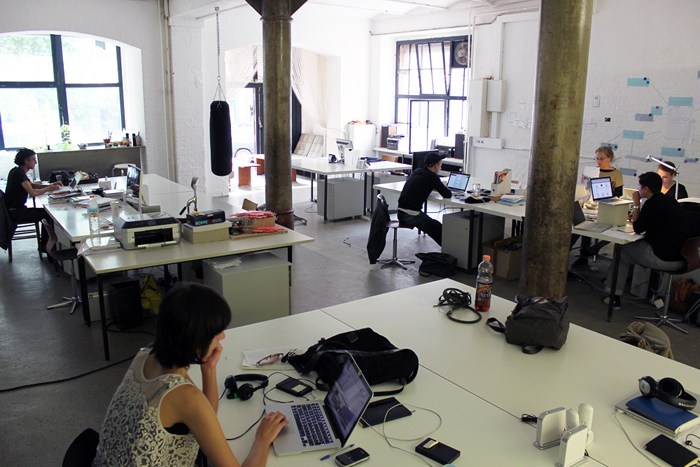The nine-to-five work schedule isn’t for everyone, and neither is working in a cubicle all day every day. Coworking provides your startup with the choice of where and when you’d like to work. Alone and eyeing a seat by the window? Take it while it’s vacant! With your whole team and need a room all to yourself? Reserve it and it’s yours. Studies show that changing where you work depending on what you’re working on can increase your productivity. Co-working spaces allow you to adjust your office boundaries whenever you like and work in a feel-good office space every day.
Better value
While renting your own private office would probably give your guests a great first impression, it would be wiser to spend your hard-earned money on the growth of your startup rather than its appearance.
A private office would allow you to have your own space, specifically tailored to your business. However, a private office would also come with a hefty bill every month - one that startups aren’t always able to afford. This would include IT infrastructure, security deposits, maintenance fees, electricity and water bills, and all the furniture and equipment your office could need. Can you imagine spending all your initial capital on desks? If you prefer an office in a central business district, that would up the cost even more.
With a coworking space, all you need to bring is your laptop. A comfy workstation is provided for you (seat, desk, power outlets included). A coworking space can be your first headquarters before your business grows and needs its own office. Sometimes, all you need to work is your quiet spot, which is why many freelancers and startups choose to work in an office that already has all the necessities.
Flexible arrangements
Co-working spaces are quite flexible in terms of their pricing and what they can offer. For instance, they come in a variety of layouts. While some offer open desk spaces where everyone can see others working and feel productive, other co-working spaces offer more secluded offices and conference rooms.
If you’re alone and just need a quick place to work, you can grab whatever spot is vacant. However, if you need privacy or a space large enough to meet with colleagues, you can rent your little room at a higher price. You get to have the perks of owning your own office, without experiencing all the costs.
You can rent a co-working space on your terms, depending on if you need to work there hourly, weekly or monthly. Most co-working spaces allow all sorts of membership arrangements, so deciding on one doesn’t have to be a terrifying financial commitment.
In Manhattan, New York, a shared desk at a coworking space goes for around $250 a month. Compare that with the office rental price of at least $1000 a month in the same area, and the answer becomes clear. You could invest that extra $750 in your business instead.
Convenience
Gone are the days when struggling entrepreneurs had to make do in coffee shops and restaurants. Co-working spaces normally offer high-speed wifi better than the local cafe, and sometimes even some coffee to make up for their lack of baristas.
Others provide clients with tea and snacks, too. Most co-working spaces are conveniently situated in busy areas close to other offices, malls and transportation hubs. You could choose one near where your clients and colleagues live to make meetings easier to schedule.
At a co-working space, you won't need to worry about who's answering the door, sweeping the floor, or refilling the snack bar. All of that is done for you, so the only thing you need to worry about is your business. This gives you more of your most precious resource: time.
Networking
Of course, you won’t be the only person at a coworking space. Working with you will be other entrepreneurs, freelancers, and startups. Every day will be an opportunity to network with others who can grow with you and maybe even help your business along the way. A short conversation in the kitchen could signal the start of a professional partnership.
As your business grows, you’ll see others’ grow, too. You can learn from their experiences as they learn from yours. A coworking space can connect you with like-minded individuals going through the same challenges.
You’ll also be able to meet people who might be kind enough to directly help you. If you need someone to do a poster of your product, you might just befriend a graphic designer interested in giving you a hand.
Sometimes, coworking spaces actively try to build a community through regularly held events, which could range from extremely fun to purely business. You could join a yoga class with them on a Monday morning, take a workshop with the crew on Tuesday, have lunch with other entrepreneurs on Wednesday, support a startup’s launch on a Thursday afternoon, and then grab a few drinks during a wild night out on Friday. You could use these special occasions to market your own business.
You could view coworking spaces as a way to get advice. You’ll be around like-minded entrepreneurs and startups that have likely gone through what you’re going through. If you’re hesitant to approach strangers, you could probably approach the coworking space managers who can introduce you to the right people if they can’t answer your questions themselves.
You might also find yourself in a coworking space that offers accelerator and incubator programs. The former assists established businesses, while the latter seeks to grow businesses that have just started. Your startup could benefit from either or both of those resources.
All in all, coworking spaces are meant for collaboration. They don’t just guarantee clients a comfortable physical space, but they also ensure an environment conducive to growing your business.
Renzo De Leon


